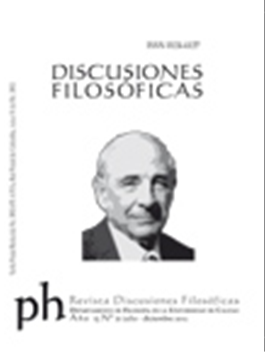Autores/as
Resumen
¿Puede ser mejor (o peor) para mí existir que no existir? Diversos filósofos lo han negado, en razón de que si lo fuera, entonces, si yo no existiera, habría sido peor (mejor) para mí, lo cual es un absurdo. En este artículo argumentamos que dichos filósofos están equivocados: las afirmaciones sobre el valor o la falta de valor comparativo de la existencia no tienen por que implicar un absurdo. Estas afirmaciones, que son de vital importancia para la ética de las poblaciones, así como para el status de la denominada "restricción de la persona que afecta" pueden racionalizarse si nos adherimos al llamado análisis de valor de las actitudes que se acondicionan.
Citas
Arrhenius, G. Population axiology. Toronto: Philosophy University of Toronto, 1999. Print.
---. Future generations: A challenge for moral theory. Uppsala: University Printers, 2000. Print.
---. “The Person Affecting Restriction, comparativism, and the moral status of potential people”. Ethical Perspectives. Sep-Dec. 2003. 185-195. Print.
---. “The repugnant Conclusion”. Stanford Encyclopaedia of Philosophy, 2006. Online.
---. “Can the Person Affecting Restriction solve the problems in population ethics?” Roberts, M. and D. Wasserman (eds.). Harming future persons. Ashgate: Springer, 2009. Print.
---. Population ethics. Oxford: Oxford University Press, 2013. Print.
Arrhenius, G., Ryberg, J. and T. Tännsjö. “The repugnant conclusión”. Stanford Encyclopaedia of Philosophy, 2006. Online.
Benatar, D. Better never to have been: The harm of coming into existence. Oxford: Oxford University Press, 2006. Print.
Broome, J. Counting the costs of global warming. Cambridge: White Horse, 1992. Print.
---. Ethics out of economics. Cambridge: Cambridge University Press, 1999. Print.
---. Weighing lives. Oxford: Oxford University Press, 2004. Print.
Bykvist, K. “The benefits of coming into existence”. Philosophical Studies. Jan. 2007: 35-362. Print.
Buchanan, A., Brock D. W., Daniels N. and D. Wikler. From chance to choice: Genetics and justice. Cambridge: Cambridge University Press, 2000. Print.
Darwall, S. Welfare and rational care. Princeton: Princeton University Press, 2002. Print.
Dasgupta, P. An inquiry into well-being and destitution. Oxford: Oxford University Press, 1995. Print.
Feldman, F. “Adjusting utility for justice: A consequentialist reply to the objection from justice”. Philosophy and Phenomenological Research. Sep. 1995: 567-85. Print.
---. “Justice, desert, and the repugnant conclusion”. Utilitas. Nov. 1995: 189-206. Print.
---. Utilitarianism, hedonism, and desert: Essays in moral philosophy. Cambridge: Cambridge University Press, 1997. Print.
Freud, S. The standard edition of the complete psychological works of Sigmund Freud. London: The Hogarth Press, 1960. Print.
Glover, J. Causing death and saving lives. London: Penguin Books, 1977. Print.
Heyd, D. “Procreation and value: Can ethics deal with futurity problems?” Philosophia. Jul. 1988: 151-170. Print.
---. Genethics: Moral issues in the creation of people. Berkeley: University of California Press, 1992. Print.
Holtug, N. “In Defence of the Slogan”. W. Rabinowicz (ed.). Preference and value: Preferentialism in ethics. Lund: Lund University, 1996. Print.
---. “On the value of coming into existence”. The Journal of Ethics. Sep. 2001. 361-384. Print.
---. “Person-affecting moralities”. Ryberg, J. and T. Tännsjö (eds.). The Repugnant conclusion. Essays on population ethics. Dordrecht: Kluwer, 2004. Print.
Johansson, J. “Being and betterness”. Utilitas. Sep. 2010: 285-302. Print.
Narveson, J. “Utilitarianism and new generations”. Mind. Jan. 1967: 62-72. Print.
Moore, G. E. Principia ethica. Cambridge: Cambridge University Press, 1903. Print.
Parfit, D. Reasons and persons. Oxford: Clarendon Press, 1984. Print.
Rabinowicz, W. “The size of inequality and its badness: Some reflections around Temkin’s inequality”. Theoria. Aug. 2003: 60-84. Print.
---. “Broome and the intuition of neutrality”. Philosophical Issues. Oct. 2009: 389 - 411. Print.
---. “Values compared”. Polish Journal of Philosophy. Jan. 2009: 73-96. Print.
Rabinowicz, W. and T. Rønnow-Rasmussen. “The strike of the demon: On fitting pro-attitudes and value”. Ethics. Apr. 2004: 391-423. Print.
---. “Buck-passing and the right kind of reasons”. Philosophical Quarterly. Jan. 2006: 114-120. Print.
Roberts, M. A. Child versus Childmaker: Future persons and present duties in ethics and the Law. Lanham: Rowman and Littlefield, 1998. Print.
---. “Can it ever Be Better Never to have existed at all? Person-based consequentialism and a new repugnant conclusion”. Journal of Applied Philosophy. Oct. 2003: 159-185. Print.
Rønnow-Rasmussen, T. “Analyzing personal values”. The Journal of Ethics. Jan. 2007: 405-435. Print.
Temkin, L. S. Inequality. Oxford: Oxford University Press, 1993. Print.
---. “Harmful goods, harmless bads”. Frey, R. G. and C. W. Morris (eds.). Value, welfare, and morality. Cambridge: Cambridge University Press, 1993. Print.
Wiggins, D. Needs, values, truth: Essays in the philosophy of value. Oxford: Blackwell, 1987. Print.

 PDF
PDF
 FLIP
FLIP





















